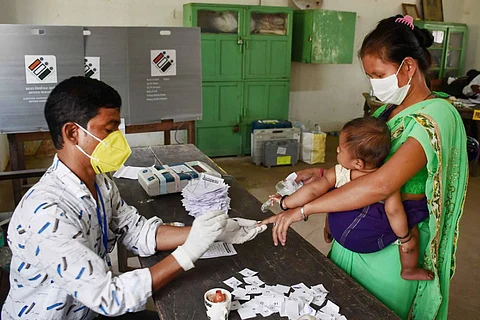

The recent state Assembly Elections have raised a debate on whether the Election Commission of India needs to be further strengthened as an independent institution or whether political actors voluntarily need to be more rule abiding, which was the basis on which the Model Code of Conduct was adopted in 1962.
In simple terms, a Model Code of Conduct is a set of minimum standards and codes for political parties, their candidates and supporters to adhere to, to ensure free and fair elections. However, in light of recent comments by West Bengal Chief Minister Mamata Banerjee asking for the renaming of the Model Code of Conduct as Modi Code of Conduct, the very integrity of the EC has been questioned while free and fair electoral competition has come under a cloud. Mamata had been banned from campaigning for 24 hours last week. This doubt continues to exist despite the recent ban imposed on the BJP MP Rahul Sinha for his comments on the Cooch Behar firing.
The comeback of single party majority in Parliament in recent years has once again brought the issue of heavy influence of the Executive on the Election Commission of India under scrutiny. For instance, the Madras High Court had to direct the ECI to probe allegations against BJP in Puducherry, where it was accused of stealing Aadhaar details of voters for targeted campaigning. It was expected that ECI could have taken suo moto cognizance of this incident. Again in West Bengal there have been allegations that Central Armed Police Forces (CAPF) are acting under influence of the ruling party at the Centre. The rationale of ECI, behind using CAPF, which falls under the Union Home Ministry, instead of local police service for security is to keep state elections away from local influences and thereby ensuring neutrality to the political parties. But such allegations are obstructing the independent and autonomous image of ECI.
What needs to be considered is whether the provisions under the Model Code of Conduct need to be incorporated and implemented through a legislation such that any violation results in more substantive penalties rather than just banning for a day or two. There have been various incidents that merit such kind of reasoning whether it was EVMs VVPATs being found at a TMC leader’s residence in Uluberia or in a BJP candidate’s car in Assam, the alleged distribution of cash coupons by BJP during the West Bengal polls or the most recent controversial remark by Mamata Banerjee on “United Muslim” appeal.
Seen in this light, the Election Commission needs to come up with reforms focusing on not only regulating the conduct of the candidates during polls but also putting in place a performance report of the candidates. Such a report should not only talk about the political performance of the candidate but in case of a first-time candidate highlight his/her prior conduct before joining politics as it would enable the electorate to assess the credibility of the candidate. This would also enable the electoral to go beyond factors like caste, community, religious identity or the self-proclaimed claims of candidates.
In order to maintain the integrity and credibility of such a report, it would be best if it is prepared by the Election Commission that not only releases data through internet, television or other audio-visual means but bestows the responsibility on the booth level officers to disseminate such information into each and every part of the concerned constituency. In this respect, the recent Kerala High Court judgement directing the Election Commission to ensure that the voters must be able to see name, photograph and symbol of candidates on the EVM machines with clarity acts as an example that the Commission can follow.
Seen in this light, inspiration can be drawn from TN Seshan who as a Chief Election Commissioner between 1990 and 1996 brought about massive changes and made the ECI an independent institution in spirit. He had brought about changes in conduct of elections by employing special electoral officers to ensure compliance of the Representation of People Act, 1951, to check for incendiary campaign speeches, voter intimidation, vote-stealing and other tactics often associated with electoral violence.
It remains to be seen whether the executive of the day ensures the independence of the ECI. It is pertinent to note that the office of Election Commission has no precedent and has been imagined by our framers afresh. It does not derive its existence from any laws during colonial times. It is vital then that this independent body should be allowed to act in its true spirit.
To conclude , the need of the hour is to bring about some innovative changes in the functioning of the Election Commission as well as to follow in the footsteps of the political ancestors, who had come together to ensure free and fair elections, and had adopted the Model Code of Conduct that was described by the former Chief Election Commissioner SY Quraishi as the “biggest contribution” by political parties.
Abhinav Mehrotra is a Lecturer at OP Jindal Global University and Prajakta Kale is an Assistant Professor at OP Jindal Global University. Views are authors’ own.